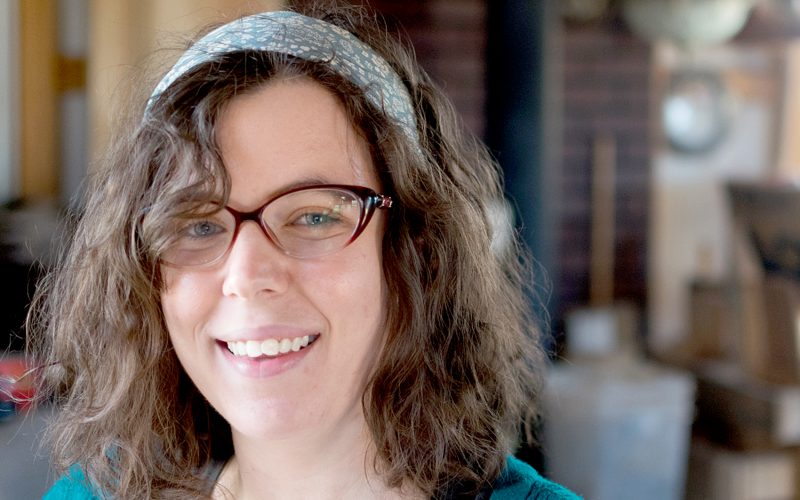
Photo by Mike Quain | Kelsey Robins, the owner and primary luthier of Odder Daughter, stands in her Bella Vista shop. Robins’ business/art project sells instruments made entirely from recycled materials.
Walking into Kelsey Robins’ shop, you know you’re seeing something special. Antique woodworking tools of all shapes and sizes line the walls. They accompany a half dozen stringed instruments in various states of construction. Dried herbs hang from the ceiling and electric guitars lay in the rafters. The shop has a lived in feel. It’s chaotic, but everything has its place, even the heap of sawdust in the corner.
Building instruments is Robins’ passion. After talking to her, you get the feeling that she doesn’t build instruments to sell; she sells instruments so that she can build. This dedication to her craft can be seen in her work. As a native to the Ozarks, she benefits from the resourcefulness and self-reliance common to these parts. Her shop is filled with odds and ends waiting to be turned into instruments: bedpans and tin cans, roasting pans and cigar boxes.
The Odder Daughter
The story of Odder Daughter Instruments began in 2011.
Robins started building instruments while studying music and English at Arkansas Tech University. During her junior year, Kelsey’s grandpa passed away, leaving behind two unfinished electric guitars.
In the following months, Kelsey decided to continue her grandfather’s work building her own guitars, each better than the last. After five years now, she still hasn’t finished her grandpa’s guitars.

Photo by Mike Quain | Two cookie tin banjos lay on display in Robins’ workshop. Cookie tin instruments have a unique reverberation not found in traditional instruments.
“I’m waiting until it feels right,” Robins said.
The original idea began as an ode to her grandfather, but has matured into something more. She’s become a formidable luthier and her projects far exceed her original scope. As her hobby grew, Kelsey began to diversify her designs. She started building cigar box guitars, tin can ukuleles, roast pan basses, and many in between.
Each of Robins’ instruments develops a unique tone. Her cigar box guitars have a warm, mellow sound, while her cookie tin ukuleles are bright and brassy. Others, like the roast pan guitar, shimmer with a sitar-like harmony. Some instruments take on an earthy, wooden tone, while others drip with reverb.
The uncommon sound of Odder Daughter instruments starts with the materials.
“Selecting a body for an instrument depends on the sound that I want,” Robins said. “Thick wood dampens the sound of an instrument.”
For that reason, she likes to find bodies that are large and have a deep shape — they simply generate more sound. Although she builds with household items of all types, Robins prefers metal bodies.

Photo by Mike Quain | A pile of guitars and ukuleles, waiting to be finished in the Odder Daughter workshop.
“They resonate, and to me it sounds kind of like a poor man’s banjo,” she said, “They’re also louder and echo in a particular way.”
William Jehle defines the term “detritomusicology” as the study of music made from discarded and reused material. Robins’ work is certainly an exercise in the discipline.
She scours dumpsters, flea markets, and scrap piles to find pieces for her instruments.
“I saw a ukulele headstock sticking out of a dumpster while I was walking back from dinner with my roommates,” she said. “I just went full throttle scaling the edge of it, trying to pick it out. Even if it’s broken, I can use some part of it.”
Building on Influence
Scrap instruments have a long history in the Ozarks. Kelsey cites the legendary instrument builder and Ozark native Ed Stilley as inspiration. Beginning in 1979, he devoted 25 years of his life to building wild stringed instruments. They were built with sawblades, old bottles, door springs, and other odd items strewn around his property. These materials resonate sympathetically with the notes played, giving them a peculiar reverberation that made him lauded.

Photo by Mike Quain |
Kelsey Robins plays on one of her cigar box guitars.
Going even further back in time to the early 1900’s, scrap instruments were built with broom stick necks, string made from unraveled screen doors, and wingnut tuners. Blues musicians were predominantly poor and had to make due with what they had laying around. These instruments helped shape the sound of early American blues music.
“Even today, building with the tools and materials on hand is a big component of cigar box guitar building, in my instruments, and in the community as a whole,” Robins said.
Although times have changed, Kelsey pushes forward and is constantly innovating. Her instruments look and feel like they belong in another age, but have amenities like electric pickups and modern tuners.
These days, Kelsey is preparing for the craft fair season in the spring while building custom orders. She plans to attend several craft shows in the area including the Bella Vista Arts and Craft Fair, the Little Craft Show in Fayetteville, and the St. Louis Cigar Box Guitar Festival. Odder Daughter will also sell and display instruments at May Bell Music in Fayetteville.
You can view Odder Daughter’s wares at facebook.com/odderdaughterinstruments










